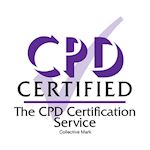CSTF Equality and Diversity and Human Rights - Level 1 - Online Course - CPD Accredited
CPDUK Accredited | Instant Course Access | Includes Assessment & Certificate | Instant Certificate Download
LearnPac Systems
Summary
- Exam(s) / assessment(s) is included in price
- Tutor is available to students
Add to basket or enquire
Overview
CSTF Equality and Diversity and Human Rights - Level 1 - Online Course - CPD Accredited.
Welcome to LearnPac Systems’ online CSTF Equality and Diversity and Human Rights training course for front-line healthcare and social care providers. All our online training courses, programmes and qualifications are accredited by the CPD Certification Service (CPDUK).
The health and social care sectors have a responsibility to ensure delivery of services and workforce management which fully demonstrate and reflect the principles of equality, diversity and human rights.
It is through the active and adequate understanding of equality, diversity and human rights that the healthcare and social care sectors will be able to recruit and retain a workforce that is more reflective of and sensitive to the population it seeks to serve.
Certificate duration: 3 years
Entry requirements: No entry restrictions
Recommended prerequisites: N/A
Assessment type: End of course assessment
Assessment pass mark – 80% needed to pass and gain a CPD certificate
Cost(s) of assessment and certification – All costs included in the course price
Awarding/Accrediting body – CPD Certification Service (CPDUK)
CSTF Equality and Diversity and Human Rights - Level 1 - Online Course - CPD Accredited.
CPD
Course media
Description
Course aims
The aim of this online CSTF Equality and Diversity and Human Rights eLearning course is to cover the learning outcomes set out in the UK Core Skills Training Framework (CSTF) for equality, diversity and human rights. To gain a certificate, learners must complete both the course and end of course assessment.
Learning outcomes
On completion of this online CSTF Equality and Diversity and Human Rights training course, the learner will:
- Understand the terms of Equality and Diversity and Human Rights and how they are applied within the context of the health sector.
- Understand how to promote a proactive and inclusive approach to equality and diversity and human rights.
- Understand the purpose and benefits of monitoring equalities and health inequalities.
- Understand the benefits that an effective approach to equality and diversity and human rights can have on society, organisations and individuals.
- Understand how legislation, organisational policies and processes can empower individuals to act appropriately and understand people’s rights.
- Know how to treat everyone with dignity, courtesy and respect and value people as individuals.
- Know what to do if there are concerns about equality and diversity practices, including how to use any local whistleblowing policy procedures and other related policies such as Bullying at Work and Dignity at Work.
For Wales only:
- Understand the Public Sector Equality Duties.
The learning outcomes above reflect a minimum standard which should be incorporated into equality, diversity and human rights education and training for all staff groups.
What is Equality and Diversity?
Patients/clients are people, and people have rights. They have the right to be treated fairly and with dignity and respect, regardless of their age, gender, ethnic origin, sexual preference, economic status or religious beliefs (or non-beliefs).
It emphasises advance equality of opportunity between people who share a protected characteristic and those who do not. Equality and diversity and human rights foster good relations between people who share a protected characteristic and those who do not.
Social equality requires the absence of legally enforced social class or caste boundaries and the absence of discrimination motivated by an inalienable part of a person’s identity. For example, sex, gender, race, age, sexual orientation, origin, caste or class, income or property, language, religion, convictions, opinions, health or disability must not result in unequal treatment under the law and should not reduce opportunities unjustifiably.
Why is this online CSTF Equality and Diversity and Human Rights training course important?
This online CSTF Equality and Diversity and Human Rights training course provides insight into equality, diversity and human rights, as outlined in the Equality Act 2010, The Human Rights Act (1998) and The Care Act (2014).
It explains how the staff with legal duties must legally fulfil their obligations. The benefits of an effective approach to equality, diversity and human rights are far-ranging for healthcare organisations, and include:
- Fair, moral and inclusive society,
- Aids recruitment and retention of staff,
- Fewer complaints.
What is covered in this course?
This online CSTF Equality and Diversity and Human Rights training course covers the following:
- Introduction to equality and diversity and human rights:
- The significance of equality and diversity,
- The relevance of Human Rights,
- NHS Constitution, and
- The commonly used terms relating to equality and diversity.
- The Equality Act:
- The significance of equality and diversity,
- The relevance of Human Rights,
- NHS Constitution, and
- The commonly used terms relating to equality and diversity.
- Promoting equality and diversity:
- Discrimination,
- Bullying and harassment, and
- The ladder of prejudice.
- Health inequalities:
- Health inequalities,
- Risk of vulnerability,
- Factors that lead to health inequalities, and
- Addressing health inequalities.
- Human Rights Act:
- The Human Rights Act, and
- FREDA principles.
- Promoting equality and diversity:
- Ways of promoting equality and diversity in the workplace using case studies,
- Working in an equal and diverse environment,
- Challenging prejudice, discrimination and unfairness,
- Tips about challenging prejudice, discrimination and unfairness
- Human Rights and FREDA principles
- Summary
- References and resources
CSTF Equality and Diversity and Human Rights - Level 1 - Online Course - CPD Accredited.
Who is this course for?
This online CSTF Equality and Diversity and Human Rights training course is suitable for all healthcare and social care staff, including unpaid and voluntary staff.
CSTF Equality and Diversity and Human Rights - Level 1 - Online Course - CPD Accredited.
Requirements
Learn anywhere, anytime on any device
You will need access to a desktop computer, laptop, tablet or smartphone device to complete these online courses. You can start, pause/stop and return to where you left off.
Our courses utilise responsive design features, making them available on any device of your choice.
CSTF Equality and Diversity and Human Rights - Level 1 - Online Course - CPD Accredited.
Career path
Our online courses and programmes range from introductory modules at Level 1 (awareness/beginner) to advanced and expert modules up to Level 6.
Our e-learning modules count towards CPD hours for professionals in various sectors as well as meeting mandatory and statutory requirements (where relevant).
CSTF Equality and Diversity and Human Rights - Level 1 - Online Course - CPD Accredited.
Questions and answers
Currently there are no Q&As for this course. Be the first to ask a question.
Reviews
Currently there are no reviews for this course. Be the first to leave a review.
Legal information
This course is advertised on reed.co.uk by the Course Provider, whose terms and conditions apply. Purchases are made directly from the Course Provider, and as such, content and materials are supplied by the Course Provider directly. Reed is acting as agent and not reseller in relation to this course. Reed's only responsibility is to facilitate your payment for the course. It is your responsibility to review and agree to the Course Provider's terms and conditions and satisfy yourself as to the suitability of the course you intend to purchase. Reed will not have any responsibility for the content of the course and/or associated materials.





